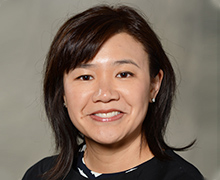Diagnostics and Treatments for Sleep Apnea
Clinical solutions for sleep apnea in children with developmental disorders
Technology Overview
While widely recognized for its prevalence and rampant morbidity in adults, obstructive sleep apnea is a disorder that similarly impacts many children. The onset of pediatric sleep apnea is not well understood compared to the adult disease process, but there are known associations with childhood obesity, craniofacial malformations, tonsil and adenoid obstruction, fetal alcohol syndrome, and other developmental disorders. While diagnosis and treatment options for adults have advanced in recent years, viable treatments for pediatric patients are used exclusively off label and without definitive safety data.
 Dr. Maida Chen
Dr. Maida Chen
Dr. Chen is the Director of the Seattle Children’s Pediatric Sleep Disorders Center. Recently, the center expanded and moved to a new state-of-the-art facility that sees patients in clinic during the day and performs sleep studies overnight, making it one of the largest free-standing pediatric-specific sleep centers in the country. Much of Dr. Chen’s work is clinically focused as she and her team diagnose pediatric patients with sleep apnea through polysomnogram studies. Waitlists for these studies are often months long, and to date, home diagnostics are not available for pediatric patients, sometimes resulting in months of interrupted sleep, with accompanying physical and emotional consequences for the patients and their families. Through her clinical work, Dr. Chen has amassed an extensive repository of brain activity and pulmonary data for patient groups suffering from obstructive sleep apnea, as well as posterior fossa malformations, epilepsy, and thoracic insufficiency syndromes. Dr. Chen has been working with these data and testing existing diagnostic systems in an effort to make definitive diagnoses and clinical recommendations more expedient and accessible to all patient groups.
Another branch of Dr. Chen’s research focuses on efficacy and safety testing of interventions for pediatric sleep apnea. Through conducting sleep studies and prescribing CPAPs for treatment, Dr. Chen has observed serious implications when using improperly fitting masks not intended for pediatric use. These consequences range from diminished effectiveness to causing facial malformations over time. Furthermore, even under ideal conditions, CPAPs only have a 40-50% tolerance rate by users, with much lower tolerability rates seen in pediatric patients, leading to loss of compliance and sleep apnea relapse.
With a first-hand view of the profound clinical need presented by pediatric sleep apnea patients, Dr. Chen hopes to collaborate with industry partners to help bring improved diagnostics and therapeutic devices to market. The sleep data generated by Dr. Chen is an untapped resource that could guide the development of new diagnostic and prognostic indicators for multiple patient groups suffering from sleep apnea. Furthermore, Dr. Chen has direct access to patient populations who would be eager to participate in validating new sleep apnea interventions.
Stage of Development
- Pilot Clinical trial
- Clinical trial
Partnering Opportunities
- Collaborative research opportunity
- Development opportunity
- Sponsored research agreement
- Consultation agreement
- Clinical trial
- Pilot data collection
- Study population access
Publications
- Tamasas B, Nelson T, Chen M. Oral health and oral health-related quality of life in children with obstructive sleep apnea. J Clin Sleep Med. 2019 Mar 15;15(3):445-452. doi: 10.5664/jcsm.7672.
- Miller C, Kirkham E, Ma CC, Filipek N, Horn DL, Johnson K, Chen ML, Parikh SR. Polysomnography outcomes in children with small tonsils undergoing drug-induced sleep endoscopy-directed surgery. Laryngoscope. 2018 Dec 21;. doi: 10.1002/lary.27759. [Epub ahead of print] PubMed PMID: 30575040.
- Akkina SR, Ma CC, Kirkham EM, Horn DL, Chen ML, Parikh SR. Does drug induced sleep endoscopy-directed surgery improve polysomnography measures in children with Down Syndrome and obstructive sleep apnea?. Acta Otolaryngol. 2018 Nov;138(11):1009-1013. doi: 10.1080/00016489.2018.1504169. PubMed PMID: 30776267.
- Hanlon-Dearman A, Chen ML, Olson HC. Understanding and managing sleep disruption in children with fetal alcohol spectrum disorder. Biochem Cell Biol. 2018 Apr;96(2):267-274. doi: 10.1139/bcb-2017-0064. Epub 2017 Oct 4. Review. PubMed PMID: 28977761.
- Dahl J, Miller C, Purcell P, … Chen M et al. Airway obstruction during drug-induced sleep endoscopy correlates with apnea-hypopnea index and oxygen nadir in children. Otolaryngology – Head and Neck Surgery. 2016.
- Roberts S, Kapadia H, Greenlee G, Chen M. Midfacial and dental changes associated with nasal positive airway pressure in children with obstructive sleep apnea and craniofacial conditions. Journal of Clinical Sleep Medicine. 2016;12(04):469-475.
- Lee A, Chen M, Abeshaus S, Poliakov A, Ojemann J. Posterior fossa tumors and their impact on sleep and ventilatory control: A clinical perspective. Respiratory Physiology & Neurobiology. 2013;189(2):261-271.
- Striegl A, Chen M, Kifle Y, Song K, Redding G. Sleep-disordered breathing in children with thoracic insufficiency syndrome. Pediatr Pulmonol . 2010;45(5):469-474.
Learn More
To learn more about partnering with Seattle Children’s Research Institute on this or other projects, email the Office of Science-Industry Partnerships.